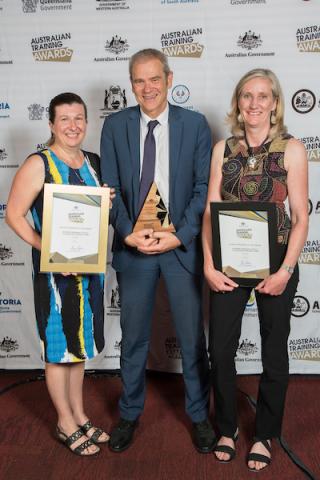
Seeing students shine brightly brings immense satisfaction to the team working at the Southern Tasmanian Catholic Colleges Trade Training Centre. Like the student who struggled through school but then completed vocational education training (VET) in hospitality, won a state equity program award and then completed a further hospitality qualification at TAFE.
‘Many students have benefited from VET,’ says Penny Driessen, the Centre’s Director, who has been working in the sector for more than 25 years. ‘Another is the student who lived in a rural area, preferred hands on training, but then successfully completed a VET program in agrifoods, gained a school-based apprenticeship in horticulture and is now studying agriculture business.’
The Centre—a co-operative effort between Guilford Young Catholic College, the Registered Training Organisation (RTO), and eight other Catholic colleges in southern Tasmania—provides a skills pathway from secondary schools through to senior secondary colleges, and then into VET. Pathways include agrifood and horticulture, automotive, construction, early childhood education, health, community services, engineering, business, hospitality, tourism, outdoor recreation and sport coaching.
It’s a special model because students can move between colleges to access specialised facilities and training.
‘We work closely with industry associations, giving them a voice and responding to the technical skills employers need,’ says Penny. ‘Consulting on labour force solutions means students gain the skills required, which increases their chances of securing meaningful work. Around 65 per cent of graduates enter full-time work in the industry they’re trained in. It’s great for Tasmania because school retention rates in the state aren’t as high as they should be. One way to improve that is through VET.’
More than 100 employers are involved in work placements across the Centre’s programs, with some extensive partnerships established. Employers provide various support, including through industry tours, speakers, career pathway presentations, masterclasses, regular use of industry facilities, access to patients and direct employment.
The Centre adopts innovative approaches to providing real-life experience.
‘One example is our students studying early childhood education,’ says Penny. ‘Through our partnership with a childcare centre, students run a weekly play group on our campus. Another example is our tourism students who greet the cruise ships that come in, getting first-hand experience with local tourism.’
As an RTO, the Centre is an integral part of Australia’s training system. Its nationally recognised training is accredited under the Australian Qualifications Framework.
For its efforts, the Centre won the prestigious 2017 School Pathways to VET Award at the Australian Training Awards.
‘Applying for the awards was a great way to recognise the work our teachers perform,’ says Penny. ‘Winning has given us an opportunity to promote what we do and the value of what we do. I’d recommend other schools give it a go.’
To find out more about how you can gain real skills for a real career through a VET qualification, visit http://www.myskills.gov.au/
